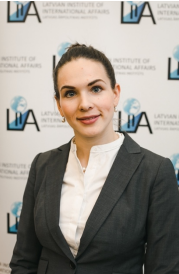The Perfect Imbalance of the Sino-Russian Relationship

Speaker(s): Bērziņa-Čerenkova, U. (Head of the Political Science Doctoral Programme & Director of the China Studies Centre, Riga Stradins University, Latvia)
Date: 7 June 2022
Speaker Session Summary
SMA hosted a speaker session with Dr. Una Aleksandra Bērziņa-Čerenkova (Head of the Political Science Doctoral Programme & Director of the China Studies Centre, Riga Stradins University, Latvia) as part of its SMA EUCOM / INDOPACOM Speaker Series.
Russia and China are working to maintain a politically unified posture to weaken the United States’ and NATO’s global influence; however, their unified posture is sometimes contradictory to their actions. Dr. Bērziņa-Čerenkova commented that a formal Sino-Russian alliance is unlikely. Instead, their partnership will continue to remain mostly symbolic and with the purpose of weakening Western democracies’ global influence. For example, Putin spoke at the latest Belt and Road Initiative (BRI) summit to show his support for China’s economic projects. He spent most of his time espousing the virtues of Russia’s own economic initiative: the Eurasian Economic Union. Also, while China supports Russia’s narrative that NATO forced Russia to invade Ukraine as a security measure, Xi is rejecting Putin’s narrative that Ukraine is governed by Nazis. China and Russia also have contradictory geopolitical interests relating to India and their overall approach to the international order. Russia frequently acts as a spoiler while China seeks to alter the already existing order to its benefit, argued Dr. Bērziņa-Čerenkova.
China’s and Russia’s mutual competition with the US and NATO will continue to act as the cornerstone of their relationship. Dr. Bērziņa-Čerenkova commented that NATO is often the difference between life and death for smaller European countries. She also stated that Russia and China do not pose the same threat to the West. Russia is considered the more immediate and existential threat to Western democracies and countries’ sovereignty. Also, the United States’ response to Russia’s aggression in Eastern Europe does not have to be unilateral with NATO for success.
Una Aleksandra Bērziņa-Čerenkova Biography

Dr. Una Aleksandra Bērziņa-Čerenkova is a political scientist and a Chinascholar, as well as the Head of the Political Science PhD programme andChina Studies Centre at Riga Stradins University and the Head of the Asiaprogram at the Latvian Institute of International Affairs. She is also amember of the China in Europe Research Network (CHERN) and theEuropean Think Tank Network on China (ETNC). After having defendedher doctoral dissertation on traditional Chinese discourse, she has helda Senior visiting research scholar position at Fudan University School ofPhilosophy, Shanghai, China and a Fulbright visiting scholar position atthe Center for East Asia Studies, Stanford University. Dr. BērziņaČerenkova is a European China Policy Fellow at MERICS and an affiliateof the Lau Institute at King's College, London as well.Dr. Bērziņa-Čerenkova publishes on PRC political discourse,contemporary Chinese ideology, EU-China relations, Russia-China, andthe BRI. Her most recent monograph is Perfect Imbalance: China andRussia (World Scientific, 2022).Dr. Bērziņa-Čerenkova has given guest lectures in several world’s leading universities, and her analysis hasappeared in Newsweek, WSJ, Politico, SCMP, France 24c die Welt, Libération, Quartz, and other outlets.
